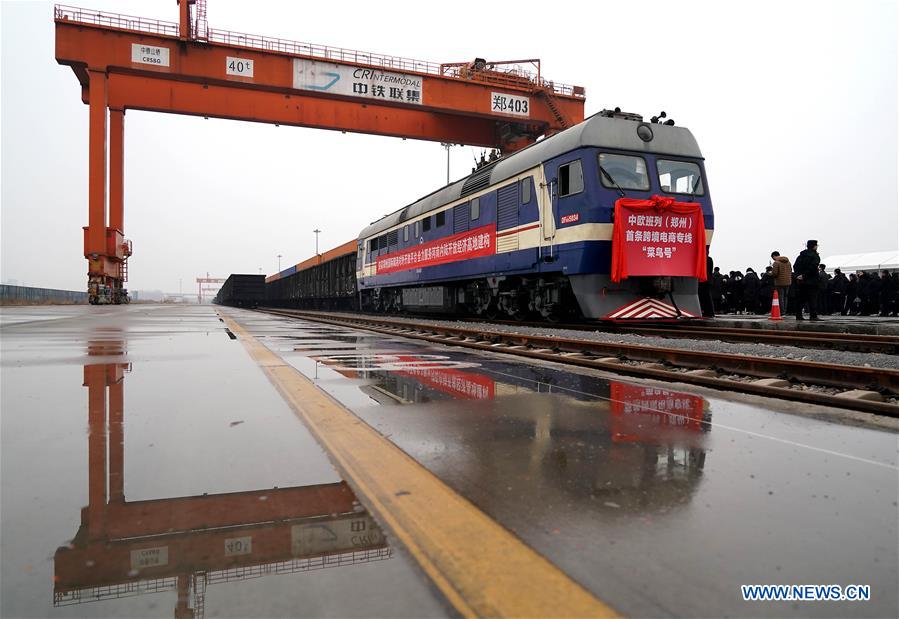Logistics at center of China-Europe trade


On the outskirts of Bardon, a small village in North West Leicestershire, United Kingdom, laser-guided forklift trucks hum across a cavernous warehouse the size of 16 soccer pitches.
Workers operate taping machines, bar code readers and other devices, sorting boxes of large items set for delivery across central England. The number of employees at Amazon's Bardon warehouse swells from 800 to 2,000 in December, when temporary workers sign on for the busy Christmas period.
The warehouse, which is leased from China-owned logistics company Logicor, has been in operation for just three years, during which time it has breathed new life into the local community, according to Andrew Bridgen, UK Member of Parliament for North West Leicestershire.
"I am very impressed with the site, and the huge investment by Amazon in North West Leicestershire will be an asset for the local community for decades to come, with huge employment opportunities," said Bridgen.
Similar stories are unfolding in numerous communities in the UK and wider Europe, as the rise of online shopping has led to an unprecedented demand for warehouse space.
In the UK alone, 22 million square meters of warehouse space was leased or purchased between 2007 and 2018. In the previous decade, 12 million square meters was procured, according to property research firm CBRE.
At the center of this boom is Logicor, which leases warehouses across Europe to a multitude of clients, including Amazon in the UK, Ikea in Hungary, and Flex in Poland.
Logicor is the largest owner of logistics and distribution properties in Europe, and since 2017 the company has been controlled by sovereign wealth fund China Investment Corporation, otherwise known as CIC.
CIC purchased Logicor from United States multinational Blackstone two years ago for 12.5 billion euro ($14 billion) in what remains the second-largest European real estate deal.
Logicor controls 621 properties with a lettable area of 13.6 million square meters in 17 countries on the continent, providing a logistics network throughout the Western reaches of the Belt and Road.
The Belt and Road Initiative is an international infrastructure and development plan first proposed by China in 2013. Since then, the initiative has bolstered trade routes and connectivity in Eurasian nations, with the establishment of new rail links and expanded port capabilities. In 2016, Chinese outbound investment in ports alone exceeded $20 billion in both equity and debt, according to investment banking firm Grisons Peak.
Logically, investment in logistics followed, including a $1-billion investment by Alibaba in Southeast Asian e-commerce company Lazada and CIC's landmark acquisition of Logicor.
Logicor has since delivered on CIC's ambitions to boost growth in European markets. Its two Amazon warehouses in the UK have employed thousands of new workers, and its sites in Lodz and Gorzow have supported growth in the high-tech manufacturing and automotive industries in Central Poland.
Last year, US electronics manufacturer Flex extended its lease for a 31,000-sq-m warehouse in Lodz.
"Lodz is a strategic market for our company, where we work with our important clients," said Krzysztof Zukowski, general manager for Flex in Poland. "After analyzing the available market offers, we decided that the Logicor proposal was optimal for us. In a rapidly changing market environment, it is crucial to work with partners who know our needs and are able to provide the highest quality of service."
Logicor has also played a critical role in supporting trade between China and Western Europe. In Duisburg, a city in the Ruhr region of western Germany, Logicor owns a 60,000 square meter warehouse logistics facility on the banks of the Rhine river. The Port of Duisburg is the largest inland port in the world, with an average annual cargo throughput of more than 40 million tons.
Duisburg has earned a reputation as the China's "gateway to Europe". Four out of every five trains from China into Europe stop in the German city. Around 30 container trains from China arrive in Duisburg each week, delivering goods from Wuhan, Chongqing and other major manufacturing centers in China. Cars, wine, whisky, luxury clothing and other European goods make the return journey.
Logicor owns 20 assets in Duisburg, and leases warehouse space in the city to Kuehne & Nagel, one of the world's largest freight forwarding companies.
And the company continues to expand its footprint in the West. Last year, Logicor invested 80 million euros in the completion of four new sites in Italy, Finland, Germany and Romania. Eight further projects are under way in Germany, Finland, the UK and Poland with a total projected cost of 79 million euros.
The company is looking at 18 further projects, primarily in Germany and France, with a total projected cost of 292 million euros.

































